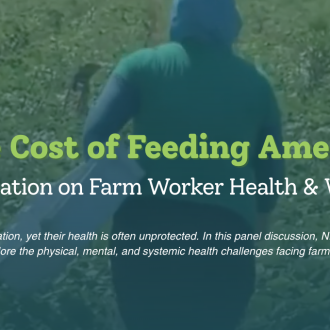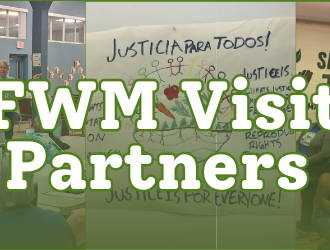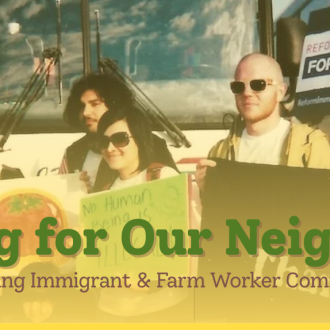By Blake Daniel, Duke Divinity Intern

We pulled up to the ramshackle farmhouse in the boondocks of North Carolina just as the sun was setting. I took stock of the rural imagery as we parked and got out of the car. This sunset is beautiful, I thought – yet my thoughts quickly ran to the farm workers whom we were preparing to visit: Each sunset merely concludes a day of sweltering summer heat. And what beautiful farmland! But would I like to work this farmland on my hands and knees twelve hours a day, six days a week? Indeed, much of the bucolic setting comes at the expense of unrewarded human labor. I couldn’t help but think, How much of this soil has blood in it?
Thankfully my cascading thoughts were diverted as we padded our way onto the front porch of the house. Both curious and cautious, we knocked on the trim of the screen door and peered through the mesh. A smiling face quickly appeared and greeted us warmly in Spanish. Alex’s disposition changed immediately as she recognized Luis, a farm worker from Veracruz, Mexico with kind eyes and a gentle presence. Luis ushered us inside and introduced us to his two coworkers and housemates, who are also from Veracruz and, like Luis, are working in North Carolina as part of the government’s H2A guest worker program.
For ninety minutes, we – Alex, Lauren, and myself – sat in the front room of this old farmhouse, beneath one exposed lightbulb and amidst stifling humidity, and we told stories. Sometimes our stories were of lighter fare – our thoughts on the World Cup, for instance, or on the awkwardness of learning another language – and sometimes our stories focused on more serious issues, like immigration reform and the recent death of a farm worker friend. Since my Spanish is pretty rusty, I spent most of the time listening.
Luis told the story of his recent journey to the US with the H2A program. He detailed the painstaking trip from his pueblo in Veracruz to the US border and finally to North Carolina, a journey that took five days in a hot, crowded bus. Upon arriving in the US, Luis – like all H2A workers – was shown a brief safety video, set up in temporary migrant housing, and put to work in the tobacco fields. Luis does receive income for his work, and thankfully H2A workers gained an increase from last year’s wages, but the hourly pay is pittance considering the arduous labor. And since the H2A program only allows Luis to be in the US during the growing season, he must return to Mexico in the fall, and hopefully repeat the process next year. This is Luis’s tenth year working in United States agriculture. He is familiar with the process and grateful for the work and pay; yet, despite his labor and track record, he is not allowed to take any steps towards citizenship or green card status. He is, frankly put, imported labor.
Yet I also heard the story of how Luis, through his ten years of working in the US, has become empowered. He is a member of the Farm Labor Organizing Committee in North Carolina and is eager to help farm workers find their voices throughout the state. He is also well aware of his rights as a worker and a human being, and, though he is dissatisfied with the condition of US immigration policy, does not seem to be discouraged or easily taken advantage of. Rather, his voice is calm and confident. Indeed, it is the voice of a hard worker who simply wants to be treated with dignity and to be adequately recompensed for his work.
I listened to Luis and his friends, who became our friends, talk in brisk Spanish and I tried to process the gravity of the scene. I was, of course, aware of the power of language as both a unifier and a stumbling block. I could follow the majority of the conversation, for which I was grateful, but I was also keenly aware that there was a lot I was missing linguistically and therefore culturally. Visiting these men made me want to hone my Spanish skills more than ever! Additionally, I was aware of the newness of the experience. While I have spent time with Spanish-speaking people in both church and academic settings, I’ve never visited a group in the United States who so often carries the label of Other. Migrant workers, particularly farm workers from Mexico, are arguably the most prejudiced against and least understood of any people group in the United States right now, even if they have proper documentation; one need only look at Arizona for proof of this. So to be sitting amongst them in their own living space was a huge step of reconciliation for me, a sign that if the three of us – all white, American, and from politically conservative backgrounds – could reach out to and learn from these oft-rejected men, then maybe a new story about immigration can really be told.
On the way home from the farmhouse, before we could even leave this little ol’ town, we were stopped at a police checkpoint outside a Hispanic tienda. The officer shone his Maglite into Alex’s face as he asked for her driver’s license. What’s all this for? she asked non-threateningly. The officer peered at her license and responded, Just a standard license check, ma’am. Nothing to worry about here.
*Note: names of people and places have been changed.



